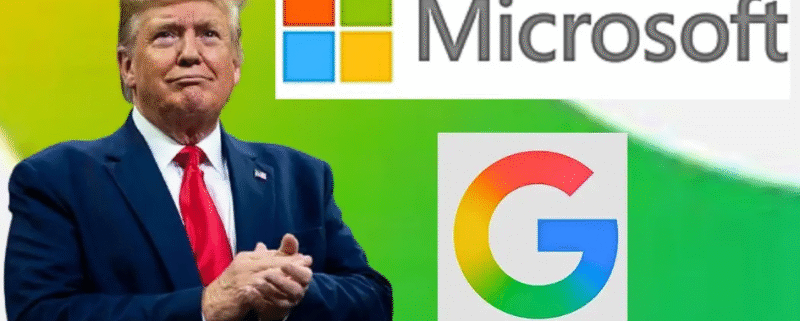Donald Trump Orders Google, Microsoft to Halt Tech Hiring in India — Calls for ‘America First’ Jobs Policy | July 25
Donald Trump’s Hiring Freeze Directive Sends Shockwaves Through India’s Tech Industry
In a powerful and controversial move, US President Donald Trump has publicly called on major American tech corporations—including Google, Microsoft, Amazon, and Meta—to halt overseas hiring, with a specific focus on stopping job outsourcing to India. The declaration, made at the AI Strategy Summit in Washington, aligns with a broader nationalist push to keep AI development, employment, and infrastructure rooted within the United States.
“Stop Hiring in India. Focus on Americans.”
Speaking to a packed hall of technology leaders, Donald Trump directly addressed what he sees as a crisis of loyalty among US-based tech firms.
“Many of our largest tech companies have reaped the blessings of American freedom while building factories in China, hiring workers in India, and stashing profits in Ireland. Under President Trump, those days are over.”
Donald Trump’s remarks were more than rhetorical. They were accompanied by three new executive orders that seek to reshape the global technology workforce by bringing jobs back to American soil and removing ideological influences from AI development.
India at Risk: What the New Policy Could Mean
India’s status as the world’s leading IT outsourcing hub may be facing its most serious threat yet. If enforced through policy, legal contracts, and federal compliance checks, the move could have wide-reaching consequences for the Indian tech sector, including:
-
Immediate slowdown or freeze in tech hiring by US multinationals operating in India.
-
Disruption of outsourcing contracts with major Indian firms such as TCS, Infosys, Wipro, HCL, and Tech Mahindra.
-
Reduced issuance of H-1B and L-1 work visas, which have traditionally been key to US-India tech labor mobility.
-
Pressure on Indian startups and service providers to restructure business models that heavily depend on US clients.
According to Nasscom data, over 60 percent of Indian IT services exports are destined for the United States. Even a partial withdrawal by US firms could severely impact employment, exports, and the country’s digital growth trajectory.
Executive Orders Signed by Donald Trump
The hiring freeze message was reinforced by the signing of three executive orders that reflect the administration’s desire to centralize AI innovation in the United States.
1. “Winning the Race” – A National AI Acceleration Strategy
-
Calls for rapid construction of data centers on US soil.
-
Eases federal compliance for AI infrastructure investments.
-
Directs tech companies receiving federal funds to publicly disclose how many American workers they employ.
2. Ban on Ideological AI (“Woke AI”)
-
Federal funding will only be available to companies creating politically neutral AI systems.
-
Trump criticized what he described as “woke algorithms” that favor diversity and inclusion over efficiency and accuracy.
-
Government agencies are now required to avoid using AI tools that display ideological bias.
“We are eliminating woke. AI models must be accurate and non-ideological. It’s not artificial intelligence—it’s genius,” Trump said during the event.
3. AI Export Promotion Order
-
Aims to position the US as the global leader in AI exports.
-
Reduces barriers to selling American AI products overseas.
-
Seeks to block global dependence on Chinese or Indian AI ecosystems.
Silicon Valley Caught in the Middle
While the Trump administration is betting on a patriotic tech revolution, many American tech leaders are reportedly uneasy. US-based technology firms have long relied on Indian talent to fill crucial roles in software development, data science, cloud operations, and cybersecurity. These new mandates may create internal conflicts between political compliance and global business realities.
A senior executive at a Silicon Valley firm, speaking on condition of anonymity, said:
“We understand the political climate, but cutting off access to India’s talent pool is not just disruptive—it’s dangerous for innovation. These orders could lead to delays in deployment, higher costs, and lower productivity.”
India’s Response: Cautious but Preparing for Impact
As of now, there has been no formal statement from India’s Ministry of External Affairs or the IT Ministry, but industry leaders and analysts are already forecasting:
-
A shift in focus from the US market toward Europe, ASEAN, and the Middle East.
-
An accelerated push for AI independence through local innovation hubs and public-private partnerships.
-
Increased lobbying efforts through trade bodies like Nasscom to mitigate visa and project restrictions.
Expert Opinions
Dr. Meera Shastri, Policy Analyst, Indian Council for Digital Economy:
“This is the strongest signal yet of an isolationist tech policy from the US. India needs to fast-track its own AI ambitions and build resilience to external shocks.”
Rajeev Menon, Former CTO, HCL Technologies:
“The Trump order is a warning to reduce dependency. The future lies in creating digital ecosystems that serve both global and domestic markets with equal strength.”
Final Word: Nationalism, Technology, and the Global Job Market
Donald Trump’s declarations may be rooted in political ideology, but the real-world impact on Indian IT professionals, students, outsourcing firms, and tech investors is already beginning. Whether this policy will endure beyond the 2025 US election cycle remains to be seen, but the age of borderless technology employment is officially under threat.
Indian companies must now restructure talent pipelines, diversify international exposure, and reimagine growth strategies in a world where digital nationalism is taking center stage.
Follow creditsamadhaan.com for more info









